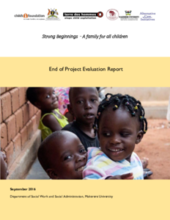Executive Summary:
Strong Beginnings (SB) was an 18-month project (April 2014 to December 2015) supported by Terre des Hommes Netherlands and implemented by Child’s i Foundation (lead agency), African Network for Prevention and Protection Against Child Abuse and Neglect (ANPPCAN), Alternative Care Initiatives (ACI) and Makerere University. The project purposed to promote an alternative care model that places emphasis on family based care of children, improving the quality of care within child care institutions, build capacities of government and non-government agencies in implementing alternative care; generate evidence and promote learning.
Purpose, Objectives and Scope of the Evaluation
The evaluation sought to assess the extent to which the project has achieved its intended objectives and identify broader lessons to inform future programming in relation to preventing unnecessary separation of children from families and facilitating the reintegration of Children in Family Care. Specifically, the evaluation sought: (i) to assess the effectiveness of the project in achieving the desired change and results and (ii) to identify and document any promising practices and approaches generated by the project, which would benefit the overall child care reform if scaled up.
Results
Overall, the project made significant contribution to the implementation of the Alternative Care Framework in Uganda; demonstrating a model of best practice to inform policy and catalyze welfare reform to priorities family base care.
Evaluation findings show that the project has contributed to the reintegration of 230 institutionalized children with their biological families, and the development of alternative family care services, through a foster care (short-term, long-term) pilot. Notably, the development of an emergency foster care program which proved to be so successful, led to the closure of the 24 bed CCI proving that it is possible to deinstitutionalize children and that children under 3 years in Uganda ought to be placed under family care.
In addition, the project made a substantial contribution towards reforming and strengthening the institutional and policy environment of the child care system in Uganda as evidenced by the establishment of an Alternative Care Implementation Unit (ACIU). The unit is based at the Ministry of Gender Labour and Social Development (MGLSD). The Panel transitioned from an Alternative Care panel based at CiF into one that is owned by the MGLSD. The ACIU conducted 159 assessments of CCIs including follow ups. These are used as a starting point for implementing the Alternative Care Framework by Government. The unit is expected to contribute, both in the short and long term, to alternative child care reform and deinstitutionalization efforts in Uganda.
The project also supported the development of several guidelines- which can be used to support the implementation Alternative Care Framework. These include the Alternative Care Panel guidelines, which inform the set up and operationalization of district alternative care panels as outlined in the National Alternative Care Framework; the CCI closure guidelines to inform District Welfare and Probation Officers, and relevant stakeholders to conduct closure in a manner that ensures that the best interests of affected children are taken into consideration and that no further harm is caused during closure.
Furthermore, through the project, the National Curriculum on Alternative Care was developed. The curriculum is expected to be used in the training for relevant stakeholders across the country.
Promising Practices
- Long term and short term foster care: Overall, both the short-term foster care and the long-term foster care programs represent good practices in alternative care which can be scaled up.
- Establishment of Alternative Care Implementation Unit (ACIU) in the MGLSD: This unit has been central to the operationalisation and embedding the implementation of the National Alternative Care Framework within the MGLSD. Further support to this unit will be required to ensure that the unit takes on the full responsibility of assessments and deliver its remit.
- Establishing a ministry-led Alternative Care panel: The multi-disciplinary decision-making panel based at Ministry of Gender, Labour and Social Development is one of the promising practices pioneered by the Strong Beginnings project, establishing a mechanism for professional, transparent decisionmaking in the best interest of the child.
- CCI transformation: The most successful partnerships were with CCI’s who understood the harm of institutional care and wanted to transform from residential facilities to services that support children in their families and communities.
- Scaling down the residential facility: From a 24 bed facility to an 8 bed facility and pioneering a short term foster care program with the Government to provide an alternative to placing children under 3 years into institutional care
Recommendations
1. The Alternative Care Unit needs to be strengthened to track and monitor all children being placed into alternative care through the provision of technical, human and logistical resources.
2. Roll out the Curriculum on Alternative Care: The curriculum should be used to build professional capacity of all those who work with children without parental care.
3. Develop standard operating procedures for reintegration of children to ensure that social workers are meeting national practice standards. The guidelines should outline the timing and process of the compulsory follow up for each reintegration case. The guidelines should clearly define the assistance and/or processes during the pre-reintegration, reintegration, and post-reintegration phases.
4. Government as the accountable party for children without parental care should spearhead the closure of CCIs that do not meet the minimum care standards.
5. There is need to support existing government structures to carry out their statutory responsibilities for overseeing the care of children in alternative care outlined in the Alternative Care Framework.
6. Improving CCI’s should only be considered as an interim measure and for the temporary care of children, rather than a long term goal that in turn increases admission of children in the care institutions. The existence of orphanages pulls families apart and thus closure of the majority of the CCIs should be the long term goal. CCIs should be supported to transition into non-residential service provider institutions, and mostly to adopt family and community based models of practice.

